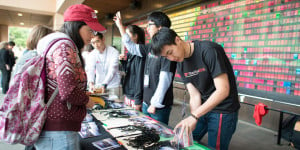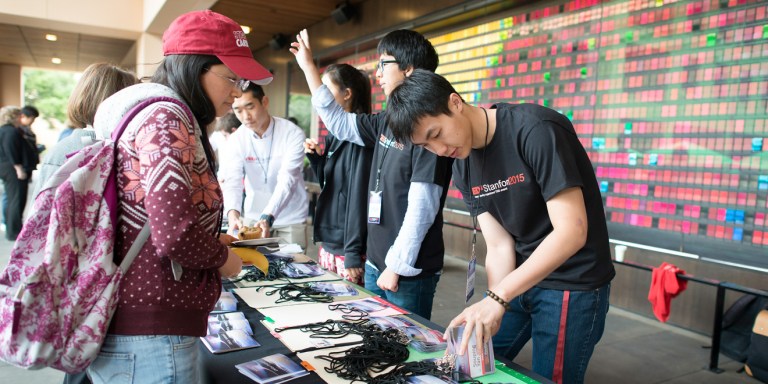
The fourth TEDxStanford took place at CEMEX Auditorium throughout the day on May 17, featuring 18 Stanford-affiliated speakers.
Themed “Turning Point,” this year’s TEDxStanford revolved around the topic of transition. The TED talks, each spanning about 18 minutes, covered a wide range of subjects of different scope, from how the speaker embraced a transformative period in life to how technological changes have been altering society.
Alice Miller, a research fellow at the Hoover Institution renowned for her studies in China affairs, shared with the audience her transition to a woman in 2006, at the age of 60.
“Everyone around me treated me as a boy with big ears, but to me, it didn’t seem right. I couldn’t quite explain it, but somehow, I wanted to be a girl,” Miller said.
In response, she forced herself to attempt “guy things,” such as going to Princeton, then an all-male university, to conceal her conflicted gender feelings so that she could “prove to the world, and to myself, that I was just a normal guy.”
Yet she also deliberately embarked on the unusual, such as deciding to study Chinese and major in Chinese history at Princeton in the 1960s, a time when it was illegal for an American citizen to travel to mainland China.
Such rebellion, however, did not further motivate her to face up to her gender psychology. Instead, the rigorous security requirements at the Central Intelligence Agency, where she worked after graduation, deepened her efforts to suppress her feelings.
It was not until after she turned 50 that Miller became determined to confront the issue directly, as her gender feelings began to reecho in her mind. In 2002, Miller began to take steps toward transition. After four years of therapy, she began to “actively live full time as a female.”
She recounted the difficult steps she had to go through, including not only the medical procedures, such as taking hormones and experiencing 350 hours of electrolysis, but also the social adjustments.
“Your social relationships have to change. You have to tell your wife, if you haven’t already, your family, your friends, and your colleagues.”
Fortunately for her, Miller’s colleagues in the East Asian studies department and Hoover offered her unreserved support.
“When I told Richard Susan, who’s the executive director at Hoover, what I intended to do, he told me, ‘Oh, I know it’s a big step for you, but it’s not for Hoover. You’re not the first to transition at Hoover.’ The next day I came to the office, they’d already changed the nameplate on my office door.”
By sharing her experience at TEDxStanford, she said she hoped to encourage more people to embrace and pursue their true identities.
“It’s never too late to be who you are,” she said.
Such personal accounts were coupled with deliberations on the changes facing the entire country and the humanity. Amy Zegart, co-director of the Center for International Security and Cooperation (CISAC), extended the series of discussions on cybersecurity held on campus to TEDxStanford.
In 2007, the annual Public Threat Assessment issued by the Director of National Intelligence ignored the issue of cybersecurity. “Not anymore,” Zegart said. “Cyber threats have vaulted to the top [of the list of dangers confronting the U.S.].”
Cyber threats, according to Zegart, are not only unprecedented, but also different from the traditional national security challenges.
“The threat environment today is crowded, complicated and uncertain, and it’s changing at the speed of cyber,” she added.
First and foremost, the United States is simultaneously the strongest combatant on the battlefield of cyber warfare and the most vulnerable one, because “we are the most connected.” The U.S. economy, civil society, government and military all highly depend on the proper functioning of cyber connectivity, leaving tremendous room for potential attacks.
“Our connectivity is the source of our strength and the source of our weakness,” Zegart said.
Zegart also identified other key differences between traditional and cyber security threats, including the government’s inability to monopolize on cyber issues and the victims’ unawareness of being attacked.
“These tiny differences have pretty significant implications for how we think about defense and deterrence in a cyber age,” she said.
Zegart concluded her talk with a serious warning.
“The cyber threats of today are annoying; they’re not alarming,” she said. “But the cyber threats of tomorrow won’t just make our information unsafe; it could make our physical world unsafe too.”
Other speakers also shared their experiences and perspectives on a variety of transitions facing society, from racial awareness to educational practices and social science methodology. World-class performers were invited to present their artistic talents on stage in between the talks.
The TED-styled event, independently organized by the Stanford community, attracted more than 700 attendees, including both Stanford students and the general public. When tickets were made available a month ago, they sold out in less than 10 minutes.
Contact Qitong Cao at qitong ‘at’ stanford.edu.
